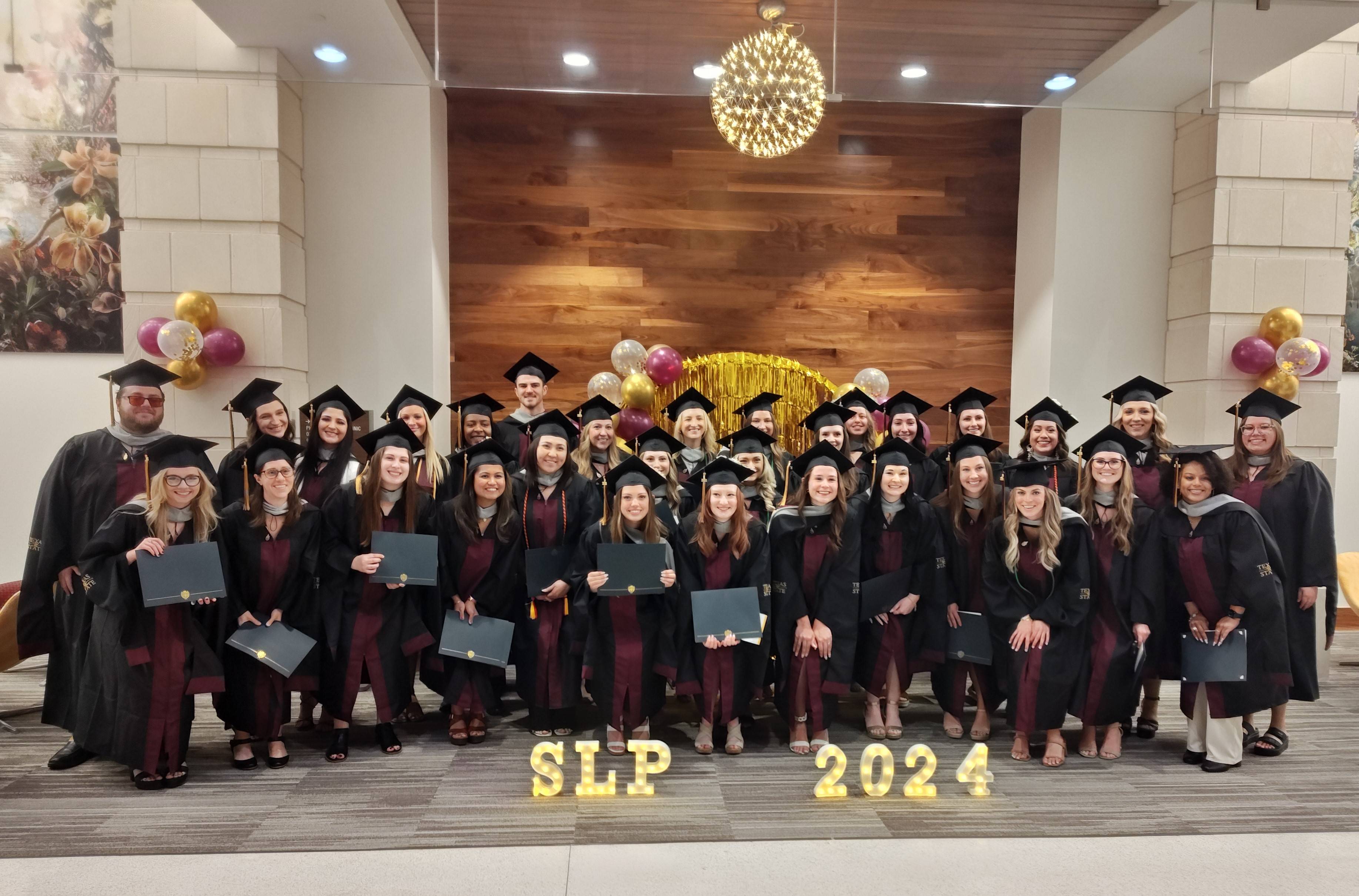Graduate Admissions Info & Requirements
Graduate Admissions
Facts about Texas State University's CDIS graduate program can be found by scrolling through the CDIS ASHA Profile webpage.
Graduate Advisor:
512-716-2624, Willow Hall Rm 253
Visit the Graduate College CDIS page for additional information on admission to the CDIS graduate program.

| Deadlines | U.S. Citizen | International |
|---|---|---|
| Fall Semester | January 31 | January 31 |
| Spring Semester | No Admission | No Admission |
| Summer | No Admission | No Admission |
| Summer Midterm | No Admission | No Admission |
-
This program has a firm deadline. If the program is not listed as an option on the online application system for a given semester, applicants may no longer apply for the program for that term. Applicants with incomplete files after the deadline will be denied admission. In order to apply for admission consideration for future terms, applicants must submit a new application, fee, and updated support documents.
-
Graduate course descriptions for this program may be viewed online in the Graduate College.
-
The Dept of Communication Disorders does not schedule individual visits for prospective leveling or graduate students, due to the high volume of requests. We will hold a Graduate Information Day in the Fall, where applicants can learn more about our Graduate and Leveling Programs. Please click here for more information. You can also contact us at cdisgradprog@txstate.edu or 512-716-2624 with any questions about the program.
Dear Graduate Applicants,
- Applications to the Master's program in Communication Disorders at Texas State will be reviewed for completion of, or enrollment in, the undergraduate courses below:
- Hearing Science
- Speech Science
- Note: Combined Hearing and Speech Science courses are acceptable
- Audiology
- Aural Rehabilitation
- Anatomy and Physiology of the Speech Production System
- Phonetics
- Neuroanatomy for Communication Disorders
- Language Development
- Two separate disorder courses; often Language Disorders and Speech Sound Disorders
- Note: These could also include neurogenic communication disorders, stuttering, voice, cleft palate, etc.
- Students accepted into the program who are missing one or more of these courses, or the ASHA-required courses, will need to indicate when the courses will be completed prior to enrollment.
- Incoming graduate students are strongly encouraged to complete the ASHA-required undergraduate courses in Biology, Physics or Chemistry, Social/Behavioral Sciences, and Statistics prior to enrollment, due to the intense nature of the graduate courses and clinical practicum.
- The Texas State University CDIS graduate program requires students to complete a Lifespan course to ensure that the ASHA lifespan requirements are fully met.
- Some missing courses may be completed at Texas State University in the summer before beginning graduate school if they are offered. Incoming graduate students may also take these courses at another university with the approval of the Graduate Advisor.
The following documents must be RECEIVED by The Graduate College by January 31 for Graduate Applicants and April 1 for Leveling Applicants:
-
Application and Application Fee
Please apply online through the Texas State University Graduate College. You will find the application by going to the Graduate College graduate programs page and scrolling to the Communication Disorders link.
The required non-refundable $55.00 application fee can be submitted with credit/debit card information during the application process. If preferred, applicants may submit a non-refundable $55.00 application fee (check or money order in U.S. currency) made payable to Texas State University. The mailing address is listed below.
Please Note: Students who change their admission status must pay the fee associated with the new application. Degree-seeking students changing majors and/or seeking multiple degrees are required to complete a new application and pay the $55.00 fee.
The international credential fee* is required if the application considered for admission is based on international credentials, e.g. you received credit from an international institution, you need to provide English proficiency exam scores, and/or you require immigration documents.
- $90 nonrefundable application fee for degree applications with international credentials.
*The international credential fee is not in addition to the application fee. The above fees are the total cost of the application.
-
Transcript and Grade Point Average (GPA) Requirement
Applicants who are a Texas State University degree recipient or are currently enrolled at Texas State University need to request transcripts for any coursework NOT listed on the Texas State University transcript. The Graduate College will provide the Texas State University transcripts.
Applicants who are not Texas State University degree recipients or are not currently enrolled at Texas State University must submit one official transcript from each college or university from which credit was received. For institutions that do not use the SPEEDE service, the secure third party vendor must send the electronic transcript to gradcollege@txstate.edu. If your previous colleges or universities do not have the ability to send official transcripts electronically in these formats, those transcripts must be mailed directly from the university or college attended or submitted in a sealed university envelope with the university registrar's signature on the back of the envelope to the following address (international transcripts must come directly from the main university’s Registrar’s Office):
Texas State University
The Graduate College
601 University Dr.
San Marcos, TX 78666-4684All applicants must hold a baccalaureate degree from a regionally accredited university. Applicants must have an undergraduate degree in communication disorders or have completed the necessary background coursework. A minimum overall GPA of 3.0 and a minimum 3.0 GPA in communication disorders courses is required.
For applicants with undergraduate degrees in areas other than Communication Disorders, please click here for information about the CDIS Leveling Non-Degree program. These applicants should apply to The Graduate College by April 1st to complete the required background work.
Applicants who have not yet graduated with a bachelor’s degree should send the transcript with the most recently completed semester’s grades. The Graduate College will only calculate an applicant’s GPA after the last long (Fall) semester of coursework prior to graduation has been completed. For example: Applicants who apply for a program that will begin Fall 2022 and expect to graduate in December 2021 or May 2022 should send transcripts with the Fall 2021 grades. If transcripts are submitted without this information, applicants will be notified and the application will not be considered complete until the updated transcript has been received.
-
Recommendations and Statement of Purpose
MUST be received by January 31 for Graduate Applicants and April 1 for Leveling Applicants
- Three (3) recommendations
- You will enter your recommenders' names and emails into the Slate system, and they will receive a request to submit a recommendation for you electronically.
- Letters of recommendation from faculty are preferred.
- Resume/CV
- Prerequisite Course Form
- Statement of Purpose - Your answers to the following questions are serving as your statement of purpose to Texas State University. Please proofread your responses carefully.
- What areas of speech pathology practice or research interest you most and why?
- Why are you applying to the Communication Disorders graduate program at Texas State University?
- Briefly describe any life experiences, situations, and/or research interests which distinguish you as an applicant.
Applicants will complete and submit the application materials listed above within the online application.
Recommenders will need to include the applicant's name and date of birth, and preferably a student ID number.
See the Grad College for more information.
- Three (3) recommendations
-
GRE and TOEFL
Graduate Record Exam (GRE) Requirement
The Communication Disorders program does not require the Graduate Record Exam (GRE).
English Proficiency Requirement (TOEFL/IELTS)
English proficiency exam scores through the Test of English as a Foreign Language (TOEFL) or International English Language Testing System (IELTS) are required to apply if English is not your native language or if you are not eligible for an automatic TOEFL/IELTS waiver. English proficiency exam scores are valid for two years after the exam date. Fluency in English is expected of all accepted students, specifically in the areas of listening, reading, speaking, and writing. In order to be eligible for admission into this program, applicants must submit scores of at least:
- TOEFL iBT – 78 overall
- IELTS (Academic) – 6.5 overall with minimum individual module scores of 6.0
Note: This program does not allow English--based conditional admission ("Bridge") based on TOEFL/IELTS scores. Applicants must submit the required scores for regular admission listed above.
If you are an international applicant or have international components to your application, please visit the International Student web page for other admission requirements that may apply to this program.
-
Scholarship Opportunities
Please visit scholarships.txstate.edu to explore scholarship opportunities. It is recommended that students apply for the Graduate College Scholarship and the Celebrity Classic Scholarship. Since students can apply for these BEFORE they are admitted to grad school, those who are accepted will be considered for the awards for their first year of graduate study. Students need to have completed the admissions application before accessing this page.
- For information regarding accreditation of the Communication Disorders program, please visit the Texas State University CDIS ASHA Profile webpage.
- To search other accredited institutions, please visit the ASHA EdFind webpage here.
| Degree | Hours | Thesis Option | Minor Option |
|---|---|---|---|
| MA | 39 hours | Thesis | Cognate required |
| MSCD | 36 hours | Non-Thesis | Cognate required |
| Graduate Program Admissions Profile | 2020 Cohort | 2021 Cohort | 2022 Cohort | 2023 Cohort |
|---|---|---|---|---|
| Applicants | 317 | 284 | 271 | 201 |
| Qualified Applicants | 279 | 255 | 225 | 172 |
| Accepted Applicants | 34 | 36 | 37 | 37 |
| CDIS Mean GPA of Accepted Applicants | 3.95 | 3.9 | 3.65 | 3.86 |
| Demographics of Accepted Graduate Applicants | 2020 Cohort | 2021 Cohort | 2022 Cohort | 2023 Cohort |
|---|---|---|---|---|
| Female | 32 | 32 | 33 | 37 |
| Male | 2 | 4 | 4 | 0 |
| Non-binary | 0 | 0 | 0 | 0 |
| White | 44% | 42% | 46% | 40% |
| Hispanic/Latino(a) | 38% | 56% | 35% | 45% |
| Asian American | 0% | 0% | 3% | 0% |
| African American | 9% | 3% | 8% | 8% |
| American Indian | 0% | 0% | 0% | 0% |
| Multi-Racial | 6% | 0% | 3% | 2% |
| International | 3% | 0% | 0% | 2% |
| Other | 0% | 0% | 0% | 0% |

